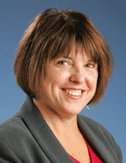
Wednesday, the Anchorage Municipal Clerk’s office began a recount of their recount of ballots cast in the Municipal Election. A group of voters requested a recount earlier this month after multiple reports of problems with the election. But some are now concerned that the counting isn’t being done right.
The group of 10 concerned voters plunked down a total $1,500, or $100 per precinct for 15 precincts, the required fee for a recount, earlier this month. They made the request after multiple reports of voting problems during the April 3 Anchorage Municipal Election. Linda Kellen Biegel is one of the voters who filed the request for the recount. She also writes for the political blog, ‘The Mudflats,’ along with several activists. She says she’s glad recount is happening, but she’s worried it’s not being done correctly.
“Number one they’re not following the procedure laid out in title 28 of the municipal code. They’re supposed to be counting the ballots against the signed registers, you know the registers that everybody signs when they come in to vote, they’re not doing that. There’s not explanation as to why. They instead they’re counting it against the AcuVote count,” she said.
Last week the Anchorage Assembly certified the election despite the reports of problems. Municipal Clerk Barbara Gruenstein supervised the Election. I took Kellen Biegel’s concern about the recount to her and she said she was not sure whether her team would check the ballots against the voter registers. I contacted Municipal Attorney Dennis Wheeler and he said that the ballots cast in each of the 15 precincts will be compared to the voter registers for each precinct at the end of the process, once the comparisons with the voting machines are done. Kellen Beigal also has other things she’s worried about. She says the clerk’s office is not counting absentee and question ballots, of which there were many more cast than usual in this election. Gruenstein says there’s nothing she can do about that, plus she’s just following code. If a vote is accepted, it’s mixed in with other question and absentee ballots.
“We do that to insure voter secrecy. They’re opened and they’re separated from their envelopes, so there’s not a way to put them back in the envelopes and put them in the right precinct,” Gruenstein said.
Kellen Biegel says she’s also perplexed that there seems to be no established counting procedure for the recount. Gruenstein says that’s true.
“The way of recounting by hand is not prescribed. And different teams do it differently. They’ve brought that up to me but certain members have agreed that certain people are more comfortable doing things different ways. And so, I don’t think that’s an issue,” Gruenstein said.
The Clerk’s Office finished the initial re-count Friday, but found that races in 7 of the 15 precincts they looked at did not match up, so they started recounting them again. There was also one entire precinct where the number of ballots exceeded the number of votes cast in the voting machine. That’s being recounted too. Gruenstien anticipates her office will present a report on the hand recount to the Assembly on May 22.
Daysha Eaton is a contributor with the Alaska Public Radio Network.
Daysha Eaton holds a B.A. from Evergreen State College, and a M.A. from the University of Southern California. Daysha got her start in radio at Seattle public radio stations, KPLU and KUOW. Before coming to KBBI, she was the News Director at KYUK in Bethel. She has also worked as the Southcentral Reporter for KSKA in Anchorage.
Daysha's work has appeared on NPR's "Morning Edition" and "All Things Considered", PRI's "The World" and "National Native News". She's happy to take assignments, and to get news tips, which are best sent via email.
Daysha became a journalist because she believes in the power of storytelling. Stories connect us and they help us make sense of our world. They shed light on injustice and they comfort us in troubled times. She got into public broadcasting because it seems to fulfill the intention of the 4th Estate and to most effectively apply the freedom of the press granted to us through the Constitution. She feels that public radio has a special way of moving people emotionally through sound, taking them to remote places, introducing them to people they would not otherwise meet and compelling them to think about issues they might ordinarily overlook.




